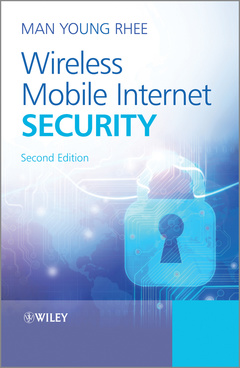Description
Wireless Mobile Internet Security (2nd Ed.)
Author: Rhee Man Young
Language: English
Subject for Wireless Mobile Internet Security:
522 p. · 17.5x25.2 cm · Hardback
Description
/li>Contents
/li>Biography
/li>
Dr. Rhee covers the technological development of wired/wireless internet communications in compliance with each iterative generation up to 4G systems, with emphasis on wireless security aspects. By progressing in a systematic matter, presenting the theory and practice of wired/wireless mobile technologies along with various security problems, readers will gain an intimate sense of how mobile internet systems operate and how to address complex security issues.
Features:
- Written by a top expert in information security
- Gives a clear understanding of wired/wireless mobile internet technologies
- Presents complete coverage of various cryptographic protocols and specifications needed for 3GPP: AES, KASUMI, Public-key and Elliptic curve cryptography
- Forecast new features and promising 4G packet-switched wireless internet technologies for voice and data communications
- Provides MIMO/OFDMA-based for 4G systems such as Long Term Evolution (LTE), Ultra Mobile Broadband (UMB), Mobile WiMax or Wireless Broadband (WiBro)
- Deals with Intrusion Detection System against worm/virus cyber attacks
The book ideal for advanced undergraduate and postgraduate students enrolled in courses such as Wireless Access Networking, Mobile Internet Radio Communications. Practicing engineers in industry and research scientists can use the book as a reference to get reacquainted with mobile radio fundamentals or to gain deeper understanding of complex security issues.
Preface xiii
About the Author xxi
Acknowledgments xxiii
1 Internetworking and Layered Models 1
1.1 Networking Technology 2
1.2 Connecting Devices 5
1.3 The OSI Model 8
1.4 TCP/IP Model 12
2 TCP/IP Suite and Internet Stack Protocols 15
2.1 Network Layer Protocols 15
2.2 Transport Layer Protocols 41
2.3 World Wide Web 47
2.4 File Transfer 49
2.5 E-Mail 50
2.6 Network Management Service 52
2.7 Converting IP Addresses 53
2.8 Routing Protocols 54
2.9 Remote System Programs 55
2.10 Social Networking Services 56
2.11 Smart IT Devices 57
2.12 Network Security Threats 58
2.13 Internet Security Threats 58
2.14 Computer Security Threats 59
3 Global Trend of Mobile Wireless Technology 63
3.1 1G Cellular Technology 63
3.2 2G Mobile Radio Technology 64
3.3 2.5G Mobile Radio Technology 67
3.4 3G Mobile Radio Technology (Situation and Status of 3G) 70
3.5 3G UMTS Security-Related Encryption Algorithm 75
4 Symmetric Block Ciphers 81
4.1 Data Encryption Standard (DES) 81
4.2 International Data Encryption Algorithm (IDEA) 99
4.3 RC5 Algorithm 108
4.4 RC6 Algorithm 123
4.5 AES (Rijndael) Algorithm 135
5 Hash Function, Message Digest, and Message Authentication Code 161
5.1 DMDC Algorithm 161
5.2 Advanced DMDC Algorithm 171
5.3 MD5 Message-Digest Algorithm 176
5.4 Secure Hash Algorithm (SHA-1) 188
5.5 Hashed Message Authentication Codes (HMAC) 195
6 Asymmetric Public-Key Cryptosystems 203
6.1 Diffie–Hellman Exponential Key Exchange 203
6.2 RSA Public-Key Cryptosystem 207
6.3 ElGamal’s Public-Key Cryptosystem 215
6.4 Schnorr’s Public-Key Cryptosystem 222
6.5 Digital Signature Algorithm 227
6.6 The Elliptic Curve Cryptosystem (ECC) 230
7 Public-Key Infrastructure 249
7.1 Internet Publications for Standards 250
7.2 Digital Signing Techniques 251
7.3 Functional Roles of PKI Entities 258
7.4 Key Elements for PKI Operations 263
7.5 X.509 Certificate Formats 271
7.6 Certificate Revocation List 282
7.7 Certification Path Validation 287
8 Network Layer Security 291
8.1 IPsec Protocol 291
8.2 IP Authentication Header 299
8.3 IP ESP 301
8.4 Key Management Protocol for IPsec 308
9 Transport Layer Security: SSLv3 and TLSv1 325
9.1 SSL Protocol 325
9.2 Cryptographic Computations 338
9.3 TLS Protocol 339
10 Electronic Mail Security: PGP, S/MIME 353
10.1 PGP 353
10.2 S/MIME 372
11 Internet Firewalls for Trusted Systems 387
11.1 Role of Firewalls 387
11.2 Firewall-Related Terminology 388
11.3 Types of Firewalls 392
11.4 Firewall Designs 398
11.5 IDS Against Cyber Attacks 401
11.6 Intrusion Detections Systems 404
12 SET for E-Commerce Transactions 415
12.1 Business Requirements for SET 415
12.2 SET System Participants 417
12.3 Cryptographic Operation Principles 418
12.4 Dual Signature and Signature Verification 420
12.5 Authentication and Message Integrity 424
12.6 Payment Processing 427
13 4G Wireless Internet Communication Technology 439
13.1 Mobile WiMAX 440
13.2 WiBro (Wireless Broadband) 448
13.3 UMB (Ultra Mobile Broadband) 452
13.4 LTE (Long Term Evolution) 457
Acronyms 467
Bibliography 473
Index 481
Man Young Rhee received his B.S.E.E degree from Seoul National University in 1952 and his M.S.E.E and Ph.D. degree from the University of Colorado in 1956 and 1958, respectively. Since 1997, Dr. Rhee has been an Invited Professor of Electrical and Computer Engineering, Seoul National University. He is also Professor Emeritus of Electrical Engineering at Hanyang University, Seoul, Korea. In addition, he has over 45 years of research and teaching experience in the field of communication technologies, coding theory, cryptography, and information security. Dr. Rhee has held a number of high level positions in both government and corporate sectors: President of Samsung Semiconductor Communications; President of Korea Telecommunications Company; Chairman of the Korea Information Security Agency at the Ministry of Information and Communication; President of the Korea Institute of Information Security and Cryptology; and Vice President of the Agency for Defense Development at the Ministry of National Defense.

